|
|
|
Sort Order |
|
|
|
Items / Page
|
|
|
|
|
|
|
| Srl | Item |
| 1 |
ID:
134334


|
|
|
|
|
| Summary/Abstract |
The alleged death of British multiculturalism has been celebrated in some quarters and regretted in others. Invoking Ulrich Beck’s discussion of zombie categories, we argue that while the appeal of ‘multiculturalism’ as a term has clearly declined, the category in Britain that it refers to encompasses not a single charter, but a series of political settlements and public policies that remain in place even though they have been joined (and frequently challenged) by others. Distinguishing between the term and the category is a valuable means of assessing the persistence of multiculturalism as a mode of integration in Britain.
|
|
|
|
|
|
|
|
|
|
|
|
|
|
|
|
| 2 |
ID:
134332
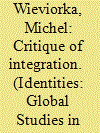

|
|
|
|
|
| Summary/Abstract |
The term ‘integration’ is a category used both in political discourse and in sociological analysis. In political discourse, in the public debate, it has become a magic word which accompanies repression when a political power is unable to deal with major difficulties, particularly in poor neighbourhoods. The so-called ‘models of integration’ are all failing, whether in the United Kingdom after the terrorist attacks of 2005, in the Netherlands after the murder of Theo Van Gogh and Pim Fortuyn, or in France after the riots of 2005. In political and social life, integration is far from able to account for realities or to implement public policies successfully. From a sociological perspective, integration is connected with approaches which are centred on society or the social system, much more than with those that deal with the subjectivity of individuals and their capacity for personal or collective action. This means that integration belongs much more to traditional sociological thinking than to the new contemporary sociological imagination.
|
|
|
|
|
|
|
|
|
|
|
|
|
|
|
|
| 3 |
ID:
134336
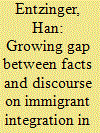

|
|
|
|
|
| Summary/Abstract |
The Netherlands’ recent history of dealing with immigrant integration provides an excellent example of the dangers of thinking in terms of fixed ‘national’ integration models. When first confronted with large-scale immigration, the Netherlands embarked on a policy of multiculturalism. Its current approach is one of the most assimilationist in Western Europe: several in-between forms have also been tried out. This article describes the evolution of Dutch thinking and Dutch policy-making on immigrant integration over the past few decades, and it analyses why the country has switched so frequently from one model to another. The harsher approach of this moment can be explained neither by major shifts that might have occurred in public opinion, nor by the actual course of the immigrant integration process, which has been advancing steadily. The root causes of the growing gap between facts and discourse lie in popular anxiety provoked by profound changes in Dutch society.
|
|
|
|
|
|
|
|
|
|
|
|
|
|
|
|
| 4 |
ID:
134338
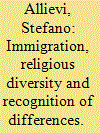

|
|
|
|
|
| Summary/Abstract |
Migration entails, among other consequences, the presence of different cultures and religions. Italy, being a latecomer among immigration countries, has had specific difficulties in acknowledging the new cultural and religious pluralism brought by migrations, due to lack of knowledge and reflection in this sphere. In the more recent context of social and cultural change in Europe, Italian society is also going through a phase characterised by reactive identities and cultural conflicts. They are producing a diffused anti-multiculturalist opinion, even though multiculturalist policies have not been openly implemented. Thus, on the one hand, this situation has so far prevented a real recognition of cultural and religious differences, particularly concerning Islam. But on the other hand, positive actions in favour of migrants can also be observed especially at the local level.
|
|
|
|
|
|
|
|
|
|
|
|
|
|
|
|
| 5 |
ID:
134335
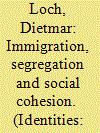

|
|
|
|
|
| Summary/Abstract |
In this article, we analyse immigrant integration against the background of German society’s social cohesion. First, we examine the integration process and policies with regard to the integration of first-generation labour migrants into the German ‘national society’ since the 1960s. Even though these ‘guest workers’ were confronted to ethnic and political exclusion owing to the so-called German integration model, they experienced socio-economic integration and, at the local level, some form of political participation. Secondly, we analyse the policies and the integration process of immigrant youth, specifically those of Turkish descent, into contemporary German society, the social cohesion of which is impeded by social exclusion and urban segregation. Our hypothesis is that – in spite of a long-standing refusal to recognise itself as an immigration country – Germany has to some extent incorporated its migrants and achieved an integration consensus, while paradoxically, national integration models in several other Western European countries are currently going through a deep crisis.
|
|
|
|
|
|
|
|
|
|
|
|
|
|
|
|
| 6 |
ID:
134331
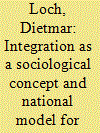

|
|
|
|
|
| Summary/Abstract |
This article introduces the special issue on the contemporary validity of national models of immigrant integration in Europe. From a historical perspective, we address integration as a sociological concept for the social cohesion of European societies and for the integration of their immigrants; subsequently, we discuss the current ‘crisis’ facing both. We then outline seven country studies in order to compare the differences and similarities of their integration models. Although the importance of national integration has decreased with urban segregation, cultural pluralisation, European integration and globalisation for citizens and immigrants, most of the contributions in this issue show that national models of immigrant integration have not completely failed.
|
|
|
|
|
|
|
|
|
|
|
|
|
|
|
|
| 7 |
ID:
134333
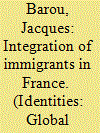

|
|
|
|
|
| Summary/Abstract |
This article seeks to identify the different factors that have facilitated or impeded the integration of immigrants in France from a historical perspective. Its aim is to shed light on the contemporary debates on the alleged failure of the republican integration model. First, we will show that – with the formation of the nation state – the integration of migrants was a constitutive element of the social cohesion of French society. Later, and during periods of xenophobia in particular, immigrants were classified according to their ability to assimilate into the French society. Since the 1970s, the double-barrelled integration question – concerning migrants and social cohesion – has reappeared. Within this context, the ‘colour-blind’ French republican model has been challenged, primarily from an economic perspective, not only by persistent social inequalities, but also, in its quintessence, by demands for cultural recognition. These factors have reinforced racial discrimination, the success of the populist extreme right and recurrent assimilation pressure.
|
|
|
|
|
|
|
|
|
|
|
|
|
|
|
|
| 8 |
ID:
134339
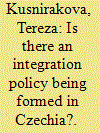

|
|
|
|
|
| Summary/Abstract |
This article critically reviews the development of Czech immigration and integration policy with special emphasis on that part of migration policy that Czechia implements relatively independently of the EU. The main objective, then, is to shed light on factors that have influenced immigration and integration policy formation. The key question of whether integration policy is being formed in Czechia and what direction Czechia is taking is answered in the following steps: description of migration policy including the role of the EU, discussion of the influence of the apolitical nature of the migration policy and analysis of the influence of alien and security discourse on the integration of immigrants into Czech society.
|
|
|
|
|
|
|
|
|
|
|
|
|
|
|
|
| 9 |
ID:
134337


|
|
|
|
|
| Summary/Abstract |
The present article offers an account of Swedish integration policies in the post-war period. The theoretical purpose is to assess Christian Joppke’s hypothesis that recent trends of integration policy convergence have rendered the national model approach analytically useless. The analysis shows that Sweden deviates, in some important respects, from the European trend by not formulating demands that link integration achievements to immigrants’ access to fundamental rights. The conclusion is that the Swedish case does not support Joppke’s hypothesis, but rather indicates that path dependency of national models is a valid explanation to ongoing developments. It is argued that the Swedish exception should be understood as an expression of the persistent impact of a policy logic according to which integration requires that all citizens have equal and universal access to certain fundamental rights. The article builds on general comparisons with European policy developments and uses Denmark as a more specific reference point.
|
|
|
|
|
|
|
|
|
|
|
|
|
|
|
|
|
|
|
|
|